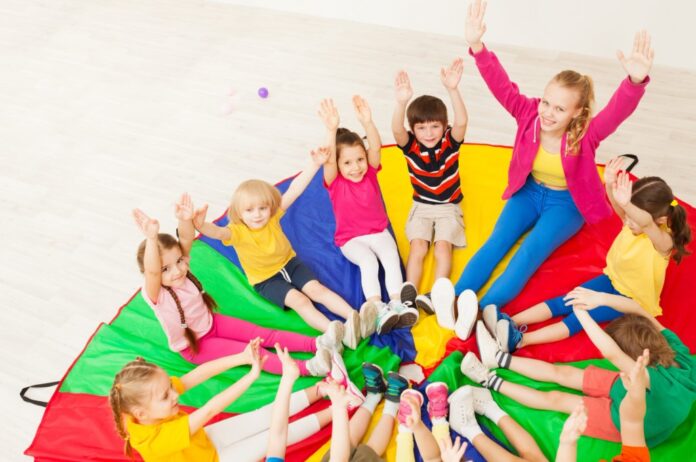
As parents or anyone involved in raising children, we often find ourselves at a crossroads when it comes to preparing the kids for school and beyond.
Traditionally, educators and teachers focused on structured curriculum and direct instruction in early childhood education. However, a different teaching style has garnered attention in recent years for its innovative and child-centric approach: play-based learning.
Children laugh and explore, their imaginations running wild as they build, paint, and play pretend. This is a special way of learning called play-based learning. It’s about letting kids learn by doing what they do best: playing!
Play-based learning uses the fun and adventure of play to help kids learn and grow. Instead of sitting quietly and listening to a teacher all the time, kids get to explore, ask questions, and discover things for themselves through play.
The Importance of Play in Early Childhood Development
You might wonder, “Why is play so important?”
Play helps kids learn how to think, remember, and solve problems. Plus, when kids play together, they learn how to make friends, share, and work out disagreements — all essential skills for school and life.
An early childhood learning environment built around play-based learning is one where kids can be themselves, try new things, and learn in their own unique ways.
And as we dive into this topic, we’ll see just how amazing play can be for learning and growing. Get ready to see play in a whole new light!
Key Components of Play-Based Learning
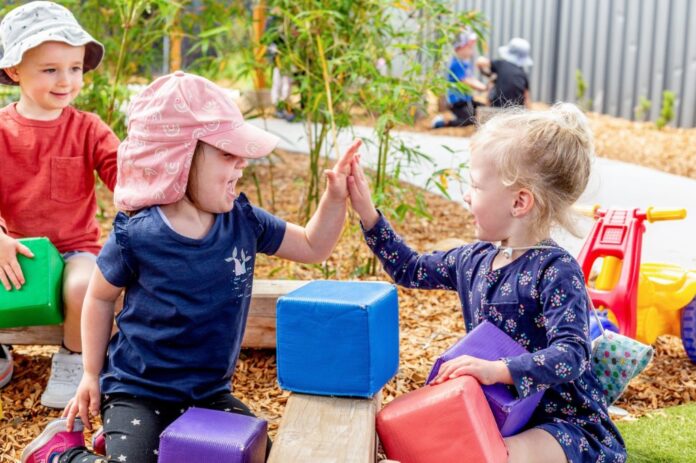
Play-based learning isn’t just about letting children play without direction. It’s a carefully structured approach that includes various types of play, each with its unique benefits.
Understanding these components can help parents and educators create an early childhood learning environment that supports overall development.
Self-Induced Play
Self-induced play happens when children choose what they want to play without an adult telling them what to do. This type of play encourages independence and decision-making.
Enjoyable Play
Think about the joy a child experiences while chasing bubbles — it’s not just about the physical activity but also about discovering how bubbles float and pop. Play must be enjoyable for it to be effective in learning. When children have fun, they’re more engaged and willing to explore.
Structured Play
Structured play is organized and often has a specific learning objective guided by an adult.
For example, a teacher might set up a game where children need to match colors or shapes. This play is essential for learning to follow the rules and work towards a goal.
Unstructured Play
Unstructured play is free play without predefined rules or objectives. It allows children to use their imagination and creativity freely. For example, a group of children playing make-believe in a sandbox is engaging in unstructured play.
Process-Oriented Play
This play focuses on the experience rather than the outcome. Arts and crafts activities are a great example of process-oriented play. Children may not end up with a masterpiece, but they learn about colors, textures, and the joy of creating something from their imagination.
Each component is crucial in developing a well-rounded early childhood learning environment. Children develop cognitive, social, emotional, and physical skills through self-induced, enjoyable, structured, unstructured, and process-oriented play.
Cognitive Benefits of Play-Based Learning
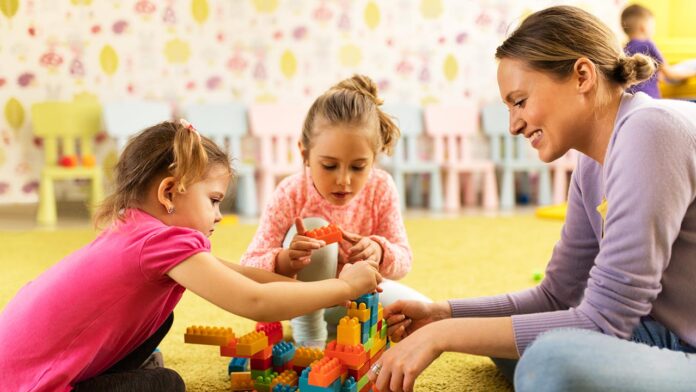
Now that we have explored the different components of plat-based learning let’s discuss its cognitive benefits. These include problem-solving skills, creativity and imagination, and attention and concentration.
Improving the Problem-Solving Skills In Your Children
- Play-based learning turns playtime into a series of mini-challenges, helping kids learn to solve problems creatively.
- As they play, they make decisions, face obstacles, and figure out solutions independently or with friends.
- This hands-on problem-solving boosts their ability to think critically and confidently approach challenges.
Encouraging Creativity and Imagination Through Play
- When kids engage in play, they invent stories, dream up characters, and explore imaginary worlds.
- This kind of play sparks creativity, encouraging kids to think in new and innovative ways.
- It shows them that there are many solutions to a problem, helping them become flexible thinkers.
Developing Attention and Concentration Through Focused Play
- Focused play activities require children to pay attention and concentrate.
- Whether they’re building a tower, solving a puzzle, or following the rules of a game, these moments of deep concentration prepare them for school.
Play-based learning lays a strong foundation for lifelong learning, providing children with the essential skills needed for academic success and beyond.
Social and Emotional Benefits of Play-Based Learning
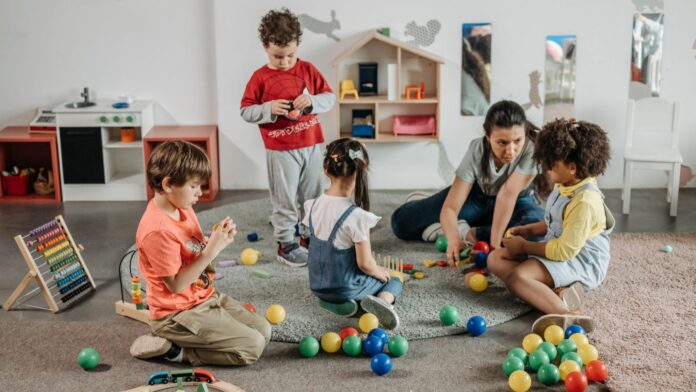
Play-based learning does not just revolve around academic skills. It is critical for children’s social and emotional growth as well. Let’s discover how it builds teamwork, promotes emotional intelligence, and boosts resilience in young learners.
Builds Social Skills and Teamwork
- Through play, children practice communication, solve problems together, and understand how to work as part of a team.
- These skills are vital for school routines and life.
Encouraging Emotional Intelligence
- Play allows children to understand their feelings and start seeing things from others’ perspectives.
- This boosts their emotional intelligence and is crucial for forming healthy relationships.
Promoting Self-Esteem and Resilience
- Children learn from their successes and setbacks in play, building their self-esteem and resilience.
- They learn to try again after failures, understanding that challenges are part of learning.
Play-based learning helps children develop into well-rounded individuals. Play’s social and emotional benefits are just as crucial as academic skills in preparing children for school.
Physical Development Through Play in Children
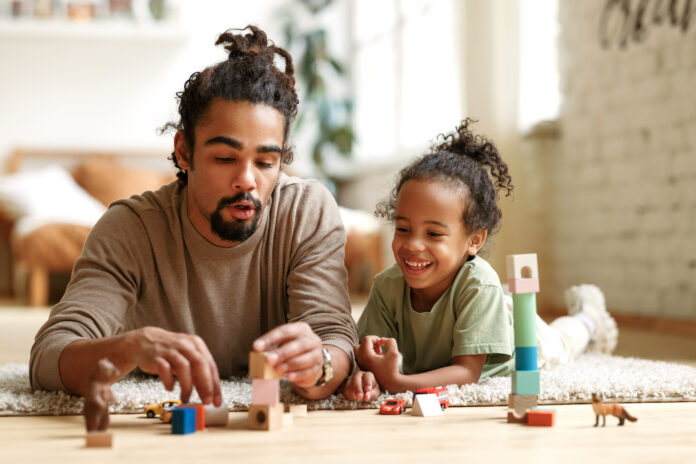
Play is a critical component of physical development in the early childhood learning environment. Through engaging in active and creative play, children build essential motor skills and establish the foundations for healthy lifestyle habits.
Let’s see in detail how play promotes physical development in children:
Improving Motor Skills
- Activities like running, jumping, and climbing enhance coordination and balance, which are gross motor skills.
- On the other hand, arts and crafts improve fine motor skills like precision and hand-eye coordination.
Encouraging Healthy Lifestyle Habits
- Active play instills a love for movement and the outdoors, promoting lifelong healthy habits.
- It teaches children the importance of self-care and nutrition, helping them understand the importance of a healthy lifestyle.
Play-based learning is key to developing motor skills and healthy habits, ensuring that children grow into physically active and health-conscious individuals.
Preparing for Academic Success
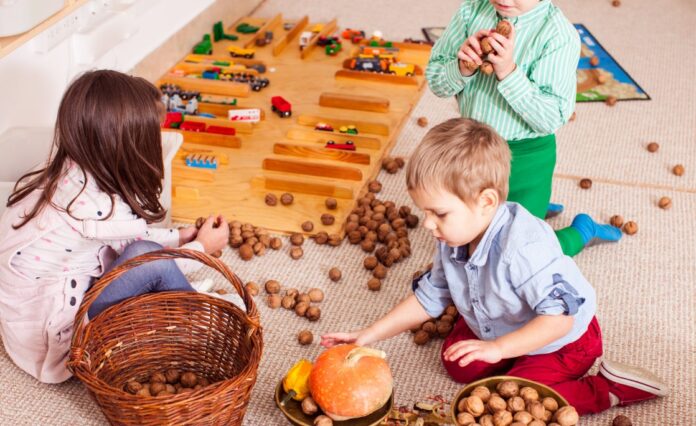
Play-based learning does more than foster social, emotional, and physical growth. It also lays the groundwork for academic success. Here’s how:
Language and Literacy Development
- Children develop language skills through storytelling, singing, and play that involves verbal communication.
- Engaging in discussions during play, learning new words, and narrating their experiences boosts vocabulary and comprehension.
Foundation for Math and Science Concepts
- Sorting toys by colour, counting objects during a game, or observing natural patterns contribute to mathematical thinking.
- Exploratory play, like mixing water and sand, helps children grasp early science concepts, encouraging curiosity about the world around them.
Play-based learning seamlessly combines language, literacy, math, and science skills into everyday play. This approach helps the children fall in love with learning and become curious about the world.
Play-Based Learning in Practice
Putting play-based learning into action can be both fun and educational. Here are some activities that show how effective this approach can be:
- Storytelling and puppet shows ─ Kids use puppets to tell stories, helping their language skills and imagination.
- Building blocks and construction play ─ Playing with blocks introduces basic math concepts and teaches kids about shapes, sizes, and balance.
- Nature walks ─ Exploring outdoors, kids observe plants, animals, and weather, sparking curiosity about science and nature.
- Water play ─ Experimenting with water in different containers teaches children about volume and physics concepts, like flow and buoyancy.
- Music and rhythm activities ─ Playing with musical instruments or engaging in sing-alongs can enhance auditory skills, rhythm, and language development.
- Puzzle-solving ─ Completing puzzles helps develop spatial awareness, problem-solving skills, and persistence.
- Treasure hunts ─ Organizing treasure hunts with clues can boost problem-solving skills and encourage physical activity.
These activities cater to different interests and learning styles, showcasing the versatility of play-based learning in promoting overall development.
How Parents and Caregivers Can Enhance Play-Based Learning?
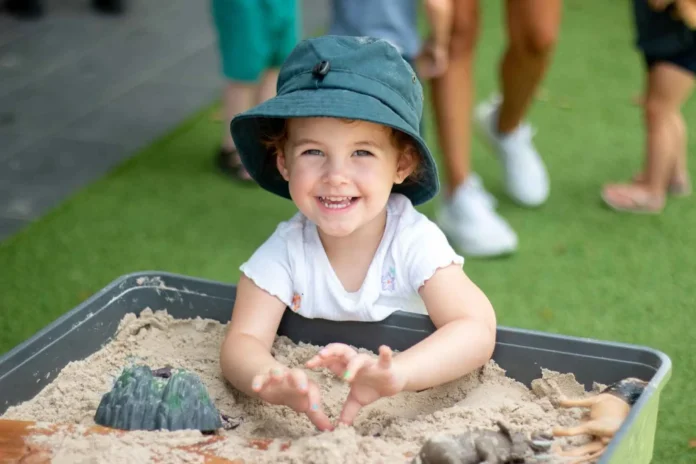
Parents and caregivers are vital in supporting play-based learning. Here are some strategies to maximise the benefits of this approach:
- Create a safe and inviting play space ─ Ensure the play area is safe and welcoming, with plenty of room to explore and move.
- Join in the play ─ Your involvement makes play more enjoyable and provides opportunities to guide learning subtly.
- Ask open-ended questions ─ Encourage curiosity and deeper thinking by asking questions that don’t have a simple yes or no answer. This prompts children to explore ideas and express their thoughts.
- Observe and listen to your kids ─ Pay close attention to your child’s interests and questions during play. This will help you choose activities and materials that further spark their curiosity and learning.
- Encourage social play ─ Arrange playdates or group play activities with peers. Social interactions are vital for developing communication skills, empathy, and the ability to work within a team.
- Limit screen time ─ While technology can be educational, hands-on play experiences are invaluable for development. Balance screen time with active, imaginative, and creative play.
By actively supporting play-based learning at home, parents and caregivers can significantly enhance their children’s development and make learning an enjoyable and integral part of their daily lives.
Final Words
Remember that play is more than just fun for kids—it’s how they learn best. For all the parents and teachers out there, keep letting kids explore and be curious. Mix up their playtime with both planned activities and free play.
Remember to join in and play with them when you can. It makes learning even more fun.
And pay attention to what they love to do—you’ll find clues on how to keep them learning and happy. These simple tips will help kids get a great start in life and love learning.











